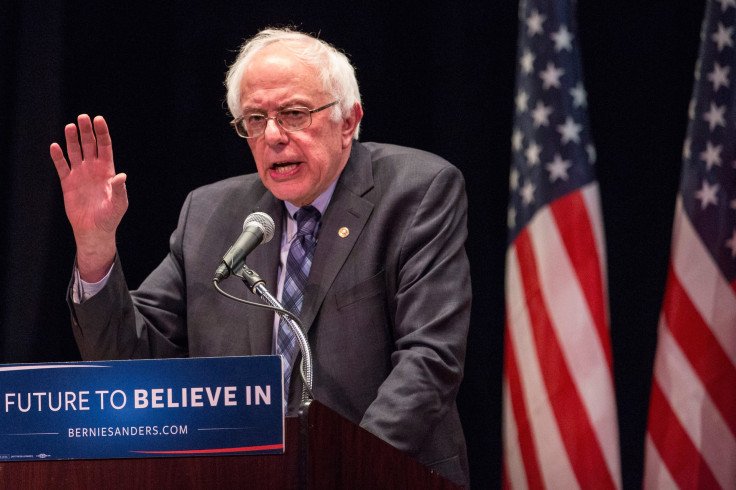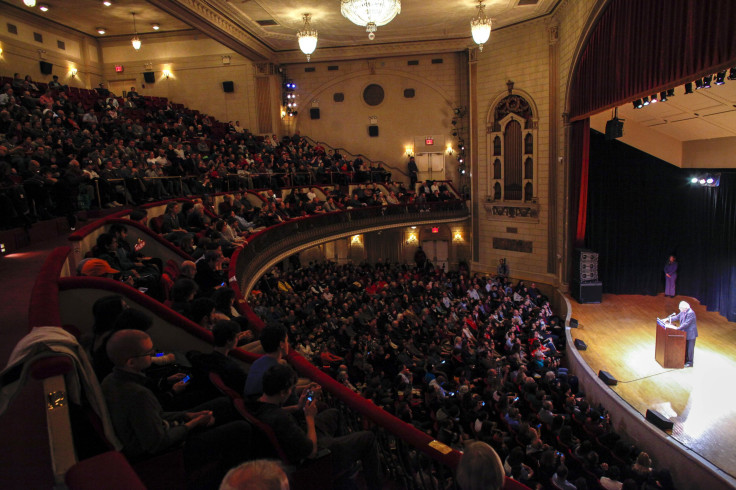Bernie Sanders Wall Street Reform Speech: Amid Hillary Clinton Attacks, Banks, Glass-Steagall Targeted

Outside of midtown Manhattan’s Town Hall theater Tuesday afternoon, hundreds of Bernie Sanders supporters lined the sidewalk and spilled over into the street while bobbing up and down in apparent anticipation of hearing the U.S. senator from Vermont speak, but also to keep warm from sub-freezing temperatures. In between shivers, they spoke enthusiastically about the Democratic White House hopeful who would soon detail his multi-pronged presidential plans for reforming Wall Street regulations.
“He’s one of the only politicians who I’ve felt that I can trust,” Ron Suarez gushed. The Democratic delegate from New York City, 65, said Sanders is the lone candidate whose approach to imposing government restrictions on big banks really makes sense and underscores how important the issue is.
Suarez was not alone in that opinion as Sanders later energized the crowd inside the venue, vowing he would even the playing field between regular Americans and Wall Street executives, advance protections to help small loan seekers and break down big banks blamed for the 2008 financial crisis. But Wall Street brass wasn’t the only target of his criticism, as he sought to further highlight differences between himself and former Secretary of State Hillary Clinton, his chief Democratic rival whom he continuously knocked for her own plans to reform the financial industry.
Will Wall Street like me? No. Will they begin to play by the rules if I’m president? You better believe it. #BreakEmUp
— Bernie Sanders (@BernieSanders) January 5, 2016“Secretary Clinton says that Glass-Steagall would not have prevented the financial crisis because shadow banks like AIG and Lehman Brothers, not big commercial banks, were the real culprits. On this issue, Secretary Clinton is wrong,” Sanders declared, defending himself from a Monday attack from her campaign. “Shadow banks did gamble recklessly, but where did that money come from? It came from the federally insured bank deposits of big commercial banks — something that would have been banned under the Glass-Steagall Act.”
Shadow banks are financial institutions, like hedge funds, that aren’t regulated in the same way as commercial banks because they do not take deposits and aren’t insured by the federal government. Glass-Steagall established a strict firewall between banks that receive deposits and those investment banks.
Throughout the speech, Sanders drove home a damning assessment of the country’s largest commercial banks — JPMorgan Chase, Bank of America and Wells Fargo, among others — saying in part that the behavior of their top executives was patently criminal and that those corporations should never receive the kind of bailouts they were extended following the 2008 financial collapse. His first 100 days as president would include compiling a list of banks that are “too big to fail” so he can shrink them until they no longer “pose a catastrophic risk to the United States economy without a taxpayer bailout,” Sanders added.
Crowd is roaring for every issue mentioned in pre speech: helping unions, income equality, attacks on trump pic.twitter.com/oc6jw1wJKY
— Clark Mindock (@ClarkMindock) January 5, 2016Bernie's new years resolution if he becomes president:. "If Wall Street does not end its greed, we will end it for them" @IBTimes
— Clark Mindock (@ClarkMindock) January 5, 2016“Not one major Wall Street executive has been prosecuted for causing the near collapse of our entire economy,” he said before pointing to a series of billion-dollar settlements between the banks and Department of Justice in the aftermath of the financial collapse. “That will change under my administration. ‘Equal justice under law’ will not just be words engraved on the entrance of the Supreme Court. It will be the standard that applies to Wall Street and all Americans.”
Wall Street regulatory reform has been a central pillar of Sanders’s 2016 campaign. Since he began his run for the White House, he has focused intently on the issue, insisting that the leniency given to big banks threatens the livelihood of regular Americans. His concentration on the issue has drawn scrutiny to Clinton, who has enjoyed a cozy relationship with the financial sector.
While Clinton has largely been pulled to the left by his positions, there are real differences in how they say they would reform Wall Street. Most specifically, they disagree as to whether or not the Glass-Steagall Act — which was repealed during Clinton’s husband’s presidency — would have kept the U.S. financial market from collapsing in 2008. For Sanders supporters, Clinton’s adamant stance on the topic is a surefire sign the millions of dollars her campaign receives from the financial industry taints her point of view.

“The banks are still too big to fail, so our effort that was made to curtail the banks hasn’t happened,” said Adam Benedetto, who was in attendance. The 40-year-old restaurant owner in Manhattan’s West Village then explained why he doesn’t think Clinton would change that calculus: She “takes money from the banks. It’s just that simple.”
Sanders, as he said Tuesday, supports implementing a modern Glass-Steagall, and thinks Clinton is letting big banks off the hook for their role in the crisis by denying the protecting power of the act.
For Clinton, the crisis was caused first and foremost by the shadow banking sector taking risky bets on subprime home mortgages. Clinton has argued that a regulation known as the Volcker Rule under the Dodd–Frank Wall Street Reform and Consumer Protection Act is sufficient to provide the safeguards needed to avoid future economic crises. Instead of a new Glass-Steagall, she wants to close loopholes in the Volcker Rule that would allow banks to invest as much as 3 percent of their capital in hedge funds.
For Sanders’s supporters, Clinton's long tenure in Washington, D.C. and her evolving positions on these issues show them she’s not as serious as Sanders is to help regular Americans instead of big banks. Sanders is a fresh voice on the national scene who isn’t corrupted by the swaying power of political contributions from major money players like banks, they say. Clinton, on the other hand, represents everything that has given the banks so much power and leniency.
“She’s the status quo. She’s the establishment,” said James Duarte, 24, a campaign volunteer at the speech who planned on catching the subway to the Bronx for a Bernie Sanders phone bank he organized. “Before he announced, I was about to succumb to the fact that Hillary Clinton was going to be our nominee. Then I felt the Bern.”
© Copyright IBTimes 2024. All rights reserved.












